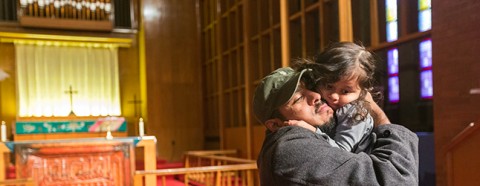Sanctuary in Portland: An immigrant and the church where he lives

Removing jackets soaked by the relentless October rains of the Pacific Northwest, supporters of Francisco Aguirre assemble in the sanctuary of Augustana Lutheran Church in Portland, Oregon, warmly greet one another, and take seats on metal folding chairs at the front of the church.
It’s October 17, four weeks since Aguirre arrived at Augustana seeking sanctuary and protection from the threat of arrest and deportation by Immigration and Customs Enforcement officers. Aside from quick smoke breaks just outside the door—accompanied by escorts—Aguirre hasn’t left the building. Some good-natured badgering by one of these escorts leads Aguirre to say solemnly he’s tried quitting many times. But at 35, the habit he picked up as a young orphan, captured by soldiers and forced into servitude during the Salvadoran civil war, is a hard one to break.
Aguirre was deported from the United States once before. Yet he continues his struggle to obtain legal residency—instead of returning to a homeland where he has no connections and continues to fear for his safety.




